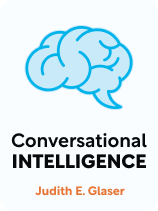

This article is an excerpt from the Shortform book guide to "Conversational Intelligence" by Judith E. Glaser. Shortform has the world's best summaries and analyses of books you should be reading.
Like this article? Sign up for a free trial here.
What is the importance of trust in the workplace? How can you build trust through good conversations?
In Conversational Intelligence, Judith Glaser writes that teamwork and success can only work if employees trust each other. More importantly, employees need to be able to trust their managers to communicate with them at any time.
Let’s look at how important trust is in any business.
Trust Is the Foundation of a Good Conversation
Glaser writes that high-quality conversations are built upon a foundation of trust. This is essentially the importance of trust in the workplace. Trust is the sense that you can express your true thoughts and feelings to the other person and that they will understand and respect these. If other people don’t trust you as a leader, your conversations will never be productive and you’ll never be able to create a collaborative, functional working environment.
(Shortform note: You might also conceive of trust in your workplace interactions as feeling safe in the workplace—this is how Daniel Coyle refers to this concept in The Culture Code. He elaborates that a safe workplace facilitates strong chemistry among employees and a willingness to go above and beyond normal responsibilities—two outcomes that Glaser would likely consider part of a collaborative, functional working environment.)
The Neurological Underpinnings of Trust
Glaser explains that feelings of trust and distrust have neurological roots and evolved as a survival mechanism, which demonstrates how important trust is to our interactions. Let’s look at what happens in the brain when you engage in conversation with someone you distrust versus someone you trust:
Every time you meet someone new, your brain must decide if they’re an ally or an enemy. This is because, from an evolutionary perspective, you need to know if the person wants to harm you, and you therefore need to flee or defend yourself. If your brain decides the other person is an enemy, it goes on the defensive: The amygdala (where fear is processed) is activated, cortisol (the stress hormone) is released, and you’re not able to trust the other person.
The result of this absence of trust is that you can’t have a productive conversation with the other person and may resort to using conversations merely to get information across to the other person without soliciting their input.
On the other hand, if you decide the other person is an ally, your brain releases oxytocin, a neurotransmitter that makes you feel connected to others. Your brain also releases happiness hormones like dopamine and serotonin. These hormones help you feel that you can trust the other person. Trust makes you open to their input and to being collaborative—in other words, it’s only in a trust state that people can hold high-quality conversations.
(Shortform note: Other researchers agree with Glaser that oxytocin makes you more trusting and connected to others. But they add that this is only toward people you already know and trust—existing allies. Oxytocin paradoxically makes you less trusting of people you don’t already know because it accentuates your instinct to bond with an in-group, which in turn increases your suspicions of out-groups. Perhaps, therefore, to reap the connective benefits of oxytocin, you must have repeated positive interactions with someone until you perceive them as an ally, and oxytocin makes you feel more trusting of them and thus able to have a high-quality conversation.)
Complicating Glaser’s Neurological Explanation of Trust
In The Body Keeps the Score, Bessel van der Kolk adds a layer of complexity to Glaser’s explanation of the neurology of trust. Van der Kolk explains that stimuli—for instance, the words and body language of the person you’re talking to—are filtered through two parts of your brain: First through the amygdala, which decides if the stimuli constitute a threat to your well-being. In Glaser’s description, this is when you subconsciously decide if the person you’re talking to is an ally or an enemy.
But second, that information is also filtered through the medial prefrontal cortex (MPFC), which is where you logically evaluate the threat level of the stimulus. This is where your brain would decide if rationally, the other person indeed poses a threat to you. Glaser doesn’t mention that information is filtered through this second part of the brain, and its existence seems to undercut her argument that once your amygdala decides the other person is an enemy, you can’t change your mind to be more trusting of them. Conceivably, you might be able to rationalize that though the other person made a bad impression and seems to be adversarial, you should spend more time with them before leaping to conclusions.
Thus, it’s possible that you can override your initial negative reaction to another person and still have a productive or meaningful conversation.
The Compounding Negative Effects of Distrust
When we feel distrustful of others, we create mental narratives through which we blame others for bad events while ignoring our own contributions to those events. This can make us feel better about ourselves, but it can interfere with our ability to see a situation clearly, contends Glaser.
For instance, if you’re working with a colleague you don’t trust to do a good job, you might create a mental narrative in which your colleague always overlooks important details. You then exclusively blame them when you get negative feedback from your supervisor on a project, telling yourself they messed up yet again.
Then, you may begin paying attention only to inputs that reinforce those mental narratives while ignoring reality. For example, on your project, you might have made mistakes yourself, but you tell yourself those were only due to your colleague’s sloppy work.
In this way, when we are distrusting, we become different people, behaving defensively and often out of character, which continues to alienate others.
You Fabricate More Than Narratives About Others
It’s human nature to create mental narratives that reflect well on ourselves—not only about people you distrust, but also about much of reality in general. Daniel Gilbert writes in Stumbling on Happiness that you do this by interpreting things that happen in your life in a way that reflects well upon you. For instance, if someone says the flowers in your yard are interesting, that word doesn’t inherently have a good or bad connotation, but you’ll likely interpret it as a compliment of your gardening skills because it reflects better on you.
You also pay far more attention to information that reinforces beliefs you already have than to information that undermines it. If you hear two people debating which flowers are better for your climate, you’ll give more credence to the debater who champions the flowers you like and have in your garden.
This all simply indicates that it may be difficult to stop creating negative mental narratives about others because you’re naturally inclined to create your own version of reality in general.

———End of Preview———
Like what you just read? Read the rest of the world's best book summary and analysis of Judith E. Glaser's "Conversational Intelligence" at Shortform.
Here's what you'll find in our full Conversational Intelligence summary:
- The importance of conversations to human growth and success
- How to deploy conversational intelligence and avoid dialogue-killing distrust
- The five steps to regain trust if you've lost it






